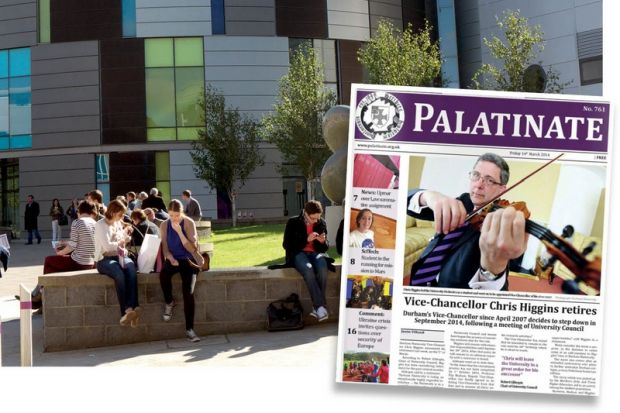Source: Alamy
Higgins: announced last month that he will retire in September
The vice-chancellor of Durham University repeatedly put pressure on student journalists to not write stories critical of the institution, Times Higher Education has been told.
Four former editors of the student newspaper Palatinate have come forward since Chris Higgins announced last month that he will retire in September, with two saying they feared at the time that they could have been expelled from the university for their coverage.
Daniel Johnson, who was one of the paper’s editors in 2011, wrote a story in the same year that revealed the university had taken a £125,000 donation from British American Tobacco, which it had agreed to keep quiet.
He also reported on disquiet in Durham’s University College over the appointment of David Held – who had left the London School of Economics amid links to Saif Gaddafi, son of the deposed Libyan leader – as college master.
Following this latter article, Mr Johnson alleges he was called into a meeting in December 2011 with Paddy Reilly, Durham Students’ Union chief executive, who relayed to him a series of demands from the vice-chancellor, including that he resign as editor. Mr Johnson said he was threatened with “serious disciplinary measures” for causing reputational damage to the university, and was concerned he could be expelled from Durham.
The vice-chancellor had demanded that in future the university see the entire newspaper before it was printed and wanted a public apology for the article, Mr Johnson claimed.
In the end, Mr Reilly managed to “defuse the situation”, with the paper agreeing to run an apology for the article and a positive comment piece by Durham’s deputy warden, he explained.
Harriet Line, a current student at Durham who edited the paper in 2013, told THE that on “several occasions” she received a “dressing down” by senior members of staff when they “disagreed with the editorial slant taken by the newspaper”.
“I was made very aware that I was in a precarious position as a student at the university,” she said.
Another former editor, who did not want to be identified, said that she and her co-editor had met a representative of the students’ union in January 2012, who relayed the vice-chancellor’s wish that all university publications promote the Durham “brand”. “It was as though the vice-chancellor wanted the newspaper to be an advertisement,” she said.
She added that she was separately accused by Professor Higgins of “smearing” the university because the paper had published a comment piece in December 2011 by a student questioning whether some Durham degrees were worth £9,000 a year.
It is understood that the piece was later removed from Palatinate’s website at the author’s request after the university challenged some of the views as “incorrect”.
Meanwhile, a fourth former editor said that in 2010 he and his co-editor were “chastised” by Professor Higgins for not running more “positive” stories.
A spokeswoman for Durham said that the university was “committed to freedom of expression within the law. We have never disciplined a student for publishing controversial material in good faith, nor would we ever do so.”
A spokesman for the students’ union said that it had “upheld and defended its members’ rights to freedom of speech”. “Where differences of opinion with the university have occurred, the union’s management and officers have robustly defended student journalism and have mediated to find solutions,” he said.





